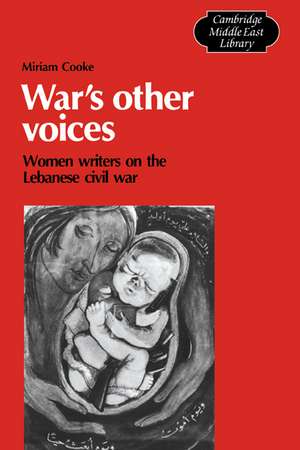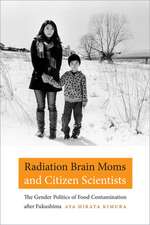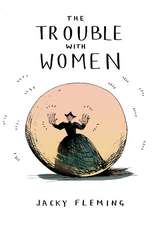War's Other Voices: Women Writers on the Lebanese Civil War: Cambridge Middle East Library, cartea 14
Autor Miriam Cookeen Limba Engleză Hardback – 28 ian 1988
| Toate formatele și edițiile | Preț | Express |
|---|---|---|
| Paperback (1) | 112.37 lei 3-5 săpt. | |
| Syracuse University Press – 30 iun 1996 | 112.37 lei 3-5 săpt. | |
| Hardback (1) | 693.18 lei 6-8 săpt. | |
| Cambridge University Press – 28 ian 1988 | 693.18 lei 6-8 săpt. |
Din seria Cambridge Middle East Library
-
 Preț: 322.12 lei
Preț: 322.12 lei -
 Preț: 297.32 lei
Preț: 297.32 lei -
 Preț: 401.80 lei
Preț: 401.80 lei -
 Preț: 286.89 lei
Preț: 286.89 lei -
 Preț: 426.78 lei
Preț: 426.78 lei -
 Preț: 176.28 lei
Preț: 176.28 lei -
 Preț: 346.61 lei
Preț: 346.61 lei -
 Preț: 209.87 lei
Preț: 209.87 lei -
 Preț: 297.82 lei
Preț: 297.82 lei - 11%
 Preț: 421.83 lei
Preț: 421.83 lei -
 Preț: 434.21 lei
Preț: 434.21 lei -
 Preț: 436.71 lei
Preț: 436.71 lei -
 Preț: 223.08 lei
Preț: 223.08 lei -
 Preț: 424.28 lei
Preț: 424.28 lei -
 Preț: 283.79 lei
Preț: 283.79 lei -
 Preț: 287.66 lei
Preț: 287.66 lei -
 Preț: 284.98 lei
Preț: 284.98 lei -
 Preț: 279.98 lei
Preț: 279.98 lei -
 Preț: 303.80 lei
Preț: 303.80 lei -
 Preț: 288.42 lei
Preț: 288.42 lei -
 Preț: 434.21 lei
Preț: 434.21 lei -
 Preț: 261.86 lei
Preț: 261.86 lei -
 Preț: 430.17 lei
Preț: 430.17 lei -
 Preț: 207.15 lei
Preț: 207.15 lei -
 Preț: 316.73 lei
Preț: 316.73 lei
Preț: 693.18 lei
Preț vechi: 778.85 lei
-11% Nou
Puncte Express: 1040
Preț estimativ în valută:
132.64€ • 138.84$ • 110.40£
132.64€ • 138.84$ • 110.40£
Carte tipărită la comandă
Livrare economică 31 martie-14 aprilie
Preluare comenzi: 021 569.72.76
Specificații
ISBN-13: 9780521341929
ISBN-10: 0521341922
Pagini: 220
Dimensiuni: 152 x 228 x 22 mm
Greutate: 0.49 kg
Editura: Cambridge University Press
Colecția Cambridge University Press
Seria Cambridge Middle East Library
Locul publicării:Cambridge, United Kingdom
ISBN-10: 0521341922
Pagini: 220
Dimensiuni: 152 x 228 x 22 mm
Greutate: 0.49 kg
Editura: Cambridge University Press
Colecția Cambridge University Press
Seria Cambridge Middle East Library
Locul publicării:Cambridge, United Kingdom
Cuprins
Acknowledgements; Introduction; Part I. A Different Experience: 1. Danse macabre; 2. The need for a myth; 3. In a new voice; Part II. A Different Expression: 4. Women's voices in Arabic literature; 5. Responsibility; Part III. A New Consciousness: 6. Then I would like to resurrect; 7. Flight against time; Conclusion; Notes; Bibliography; Index.
Textul de pe ultima copertă
This book challenges the assumption that men write of war, women of the hearth. The Lebanese war has seen the publication of many more works of fiction by women than by men. Miriam Cooke has termed these women the Beirut Decentrists, as they are decentered or excluded from both literary canon and social discourse. Although they may not share religious or political affiliation, they do share a perspective which holds them together. Cooke traces the transformation in consciousness that has taken place among women who observed and recorded the progress towards chaos in Lebanon. During the so-called "two-year" war of 1975-76, little comment was made about those (usually men in search of economic security) who left the saturnalia of violence, but with time attitudes changed. Women became aware that they had remained out of a sense of responsibility for others and that they had survived. Consciousness of survival was catalytic: the Beirut Decentrists began to describe a society that had gone beyond the masculinization normal in most wars and achieved an almost unprecedented femininization. Emigration, the expected behavior for men before 1975, was rejected. Staying, the expected behavior for women before 1975, became the sine qua non for Lebanese citizenship. The writings of the Beirut Decentrists offer hope of an escape from the anarchy. If men and women could espouse the Lebanese women's sense of responsibility, the energy that had fueled the unrelenting savagery could be turned to reconstruction. But that was before the invasion of 1982.









